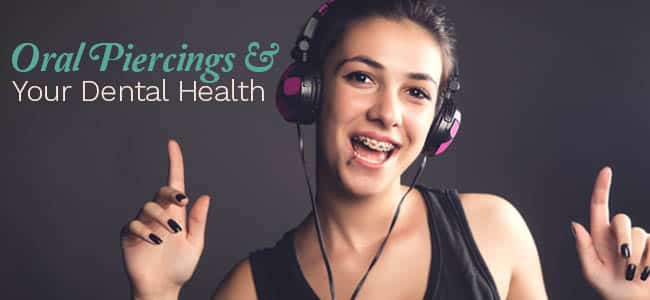
A Healthy Smile Is Your Best Accessory
Body piercings have become increasingly prevalent over the past decade, and with more and more celebrities like Victoria Beckham, Tyrese, and Christina Aguilera sporting them, they are only gaining popularity among people of all ages. While piercings offer people the opportunity to express their individuality and add some extra bling to their personal style, some of the most popular piercings are located in the mouth area, which can be problematic.
Do oral piercings damage teeth?
Oral piercing can hurt your teeth and gums. It’s already easy enough to damage your teeth from day to day activities like chewing ice or trauma from sports. Complicate things with a piece of metal jewelry you just make it more likely to crack an incisor. In addition to an increased chance of injury an oral piercing can irritate your gums. Even without trauma having a stainless steel ball rubbing along your teeth can lead to enamel damage, scratches, and tooth sensitivity.
If you’ve had any dental work done—including fillings or crowns—oral piercings can damage these as well, so if you don’t want to spend more money and time in the dental chair having your dental work repaired, we recommend choosing a non-oral piercing—if you’ve really got the urge to pierce something
Popular face and mouth piercings include those in the tongue, lip, and cheek areas. The following are just some of the health risks and side effects associated with these piercings.
- Infection: Your mouth is home to a large number of bacteria that breed in moist environments. This is the perfect environment for an infection to occur. When an infection occurs in your mouth, it can become life threatening if not treated immediately.
- Excessive bleeding: On occasion a blood vessel gets punctured during the piercing process and results in prolonged bleeding. If not dealt with properly, severe blood loss can cause complications.
- Damaged gums and teeth: People with mouth piercings often develop the habit of playing with them, which may include biting and twirling them around the mouth. This can lead to scratched, cracked, and broken teeth and fillings. It can also damage the gum line.
- Allergic reactions: Sometimes people may unknowingly be hypersensitive to metals and can experience an allergic reaction.
- Nerve damage: Numbness at the site of the piercing is common. However, in some cases it remains a permanent condition due to nerve damage.
- Excessive saliva: Heavy salivation can result from wearing jewelry in your mouth. This can cause complications with your ability to chew and swallow correctly. It can also interfere with the pronunciation of words.
If you do decide to get a face or mouth piercing, or if your child or adolescent has one, be prepared for four to six weeks of healing time. The following are some tips that will help you maintain your oral health should you decide to keep or get a mouth piercing:
- Make sure to keep the piercing site clean after you eat. Clear away any food particles by using mouthwash after each meal.
- Remove all jewelry when participating in sports, and ask the dentist about getting a mouthguard for protection.
- If you notice that you are developing habits that include biting or clicking your piercing against your teeth, stop immediately or consider removing the jewelry.
- If you think you may have an infection or might be developing an allergic reaction to the metal in your mouth jewelry, remove it immediately and call your doctor.
The ADA advises against getting body modification to the mouth and considers these as invasive procedures with negative health benefits that outweigh the cosmetic effect on a person.
How do you protect your teeth with oral piercings?
If you already have piercings or decide that you want to get one there are ways to help protect and preserve your oral health.
- Keep the area clean – Be aware of food debris that can support harmful bacteria and pay extra attention to cleaning around the piercing or modification to prevent infection.
- Avoid rubbing your jewelry on your teeth – by preventing the metal parts of the jewelry from common in contact with your teeth you can prevent enamel damage. You should also pay attention the jewelry while speaking and eating to prevent accidents.
- Be extra mindful of oral hygiene – Brush your teeth twice each day, floss, use an oral rinse around the piercing and visit your dentist every six months to ensure that the piercing isn’t causing damage.
Choosing to get a facial or oral piercing is an aesthetic decision that impacts your oral and whole health. Your at-home oral hygiene routine will be more important than ever should you choose to get one, as will your routine visits to the dentist and your dental cleanings. Make sure to let our provider know if you have an oral or mouth piercing so that he can help create a dental plan that will protect and maintain your best oral health.
To find out more about mouth piercings, your oral health, and how we can help protect your teeth and gums, give your Palmdale dentist a call at 661.202.3542 today.


